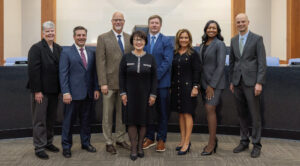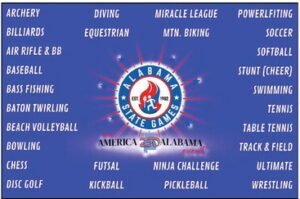Seal of Biliteracy bolsters Madison students’ future success
MADISON — For the average worker in today’s society, being multilingual is not only an attractive quality to employers, but it is becoming more and more of a necessity in both the workforce and everyday life.
Madison City Schools has previously been recognized for their world language programs, and in true MCS fashion, they are taking the program a step further by offering the Seal of Biliteracy distinction to graduating high school seniors.
The Seal of Biliteracy exists in the United States to encourage students to become proficient in another language. By offering this distinction, officials hope this will not only help them learn another language that they can use to build a successful career later on, but they also hope it will inspire students to become good examples of global citizens now.
According to the Seal of Biliteracy website, 35 states and Washington, D.C., have approved the state seal while 12 more states are either considering it or are in the early stages of implementation. The Madison City Board of Education voted to approve the implementation of this distinction earlier this year.
A Seal of Biliteracy Taskforce, led by co-chairs and world language teachers Peggy Boynton and Angela Mooney, began meeting last May to get the ball rolling. Boynton and Mooney led various subcommittees tasked with researching how other places were working their Seal of Biliteracy, finding out how students and parents felt about it, looking into different assessments they could use to measure students’ proficiency, and more.
Seal of Biliteracy Taskforce Co-chairs Peggy Boynton, left, and Angela Mooney, right, discuss the Seal of Biliteracy at an instruction committee meeting in late 2018. CONTRIBUTED
“People are really excited about it,” said Boynton, who teaches German and Latin at James Clemens High School. “… My students that I have in my classroom are also really excited about earning this … you go through all these different courses, and there’s kind of a nice carrot at the end to say, ‘Hey, you are really good at this thing, and we have proof of it.’”
In mid-February, MCS Superintendent Robby Parker received the Friend of Languages Award from the Alabama World Language Association for his strong support of world language programs in MCS. Recently, he has also mentioned a bold plan for students in the school district.
“One of my goals and the board’s goals is we want every child to be bilingual—fluent in a second language—by the time they graduate from James Clemens and Bob Jones,” Parker declared at his State of the Schools address Feb. 26. “… The world’s getting smaller and smaller. If we want our kids to be globally competitive, they better be able to communicate.”
In accordance with that goal, MCS has been greatly expanding their world language programs. While students have long had the opportunity to begin taking a foreign language in middle school, students as young as pre-K can be exposed to another language as well.
In 2018 alone, MCS added Spanish classes to the fourth grade with plans to add it to fifth grade next year, and Parker said MCS students K-12 will soon be able to learn Spanish. Level-I French, Mandarin Chinese, Latin and German courses were also made available to sixth- and seventh-graders in 2018. Also planned are Level II of those languages for the seventh and eighth grades.
For Bob Jones High School student Johnathan Hampton, learning another language has become a crucial tool that has helped him connect with others and broaden his own horizons. Though he had forgotten most of what he had learned in his elementary French classes by the time he joined MCS, he has been able to gain back that knowledge and so much more through his French classes at Bob Jones.
“One (benefit) is just being able to think outside of the box—being able to set aside one way of thinking to open yourself up to another way of thinking that may not necessarily be the same as yours, so that helps you to be more receptive to other people and more open to understanding other people and just being able to connect with different cultures even though their beliefs or their customs might not line up with the culture here,” he said.
Johnathan Hampton has studied French and Spanish at Bob Jones High School. (Record Photo/Kendyl Hollingsworth)
Beyond that, though, Hampton said his language classes have even helped him become better at English. From grammar and sentence structure in lower-level language courses to literature and philosophy in higher levels, Hampton has been able to make that connection to strengthen his skills on both ends.
Since completing his studies in French and scoring high on his AP French exam, Hampton has been working to find other ways to keep his French skills sharp.
“At this point, I’ve kind of moved on to external ways to keep using French, so I do tutoring,” he said. “I actually tutor someone in French, I have contact with a French family, and we speak on a regular basis.”
As president of the French Honor Society, Hampton also finds opportunities through the organization and French conventions—one of which occurred this month—to keep speaking the language. He also traveled to Europe last summer and said he was able to communicate with others and read signs while visiting Paris, France.
Boynton, who has seen similar benefits in her own life from learning to speak German, said she has met several people in Madison with whom she can speak German.
“I definitely use my language skills here in the United States as much as I do when I’m abroad … and that’s something that I’m trying to tell my students all the time,” she said. “When I’m here and I meet people who are German speakers, or I meet people who have lived in Germany or have spent time in Germany or a German-speaking country, it also gives us something to kind of connect with. … People are always surprised and appreciative when you can speak with them in their language. Even if it’s just a basic thing … people really respond to that.”
As a teacher, Boynton said she and other world language teachers also work to incorporate lessons on culture in addition to language, something Hampton has picked up on.
“I think that absolutely, if we want to be important players in the global market, our students need to have global skills, and not just for language but also the culture because it’s about communicating with people, but it’s also about understanding where people come from and understanding that people have different perspectives and different values, and they’re just as valid as ours,” she explained. “We can help build respect between people, and that’s super important that my students get to (do that).”
Teachers and MCS officers discuss the benefits of the Seal of Biliteracy at a meeting in late 2018. CONTRIBUTED
A pamphlet about the Seal of Biliteracy states that the distinction “is awarded to graduating seniors who during their studies in Madison City Schools prove proficiency in English and one or more other languages. The achievement demonstrates the student’s proficiency in both social (speaking and listening) and academic (reading and writing) uses of language.”
Since Hampton has been doing just that, he has already filled out the application for the Seal of Biliteracy and will become one of the first students in Madison to earn the recognition. “I’m really excited on that end and really honored to be one of the first few people to do that so far,” he added.
Though some may think Parker’s goal to have all students graduate with proficiency in another language is ambitious, students like Hampton continue to demonstrate that it is possible. He may have already succeeded in all French courses, but he isn’t stopping there. Hampton said he is also taking Spanish I this semester and plans to continue his Spanish studies at Auburn University.
For those who are currently studying a language or even considering whether they want to do so, Hampton shared a few words of advice and encouraged people to “follow their heart” when picking a language to study.
“One thing I would say is to be patient with yourself in learning the language,” he said. “There’s going to be times where you mess up. I mess up all the time, you know? There’s always things that you’re not going to know how to say. The key is not to get discouraged but to be patient with yourself. If you’re not patient with yourself, you’re more likely to give up, but you have to give yourself time to just look at it, to learn it, and most importantly, to use it and to not be afraid to use it, but to try your best.
“I know there have been a lot of people in my French classes who aren’t confident in their speaking, aren’t confident in their writing, and it holds them back because they’re scared to make mistakes, but I think the biggest thing is to see past that and (realize) that everybody is going to make mistakes.”
As he prepares to study landscape architecture in college and build on his Spanish, Hampton said he will take with him several lessons from his classes at Bob Jones. In addition to learning to challenge himself, he said Bob Jones has also taught him how to be resourceful in finding other outlets to keep up his skills. With that, he has also learned to work hard, set goals, remain true to them and be consistent in his efforts to reach them.
“It really is a journey, and it does take some patience, and it takes hard work, but it’s definitely been rewarding for me,” he said.
For more information on the Seal of Biliteracy, visit sealofbiliteracy.org.
















